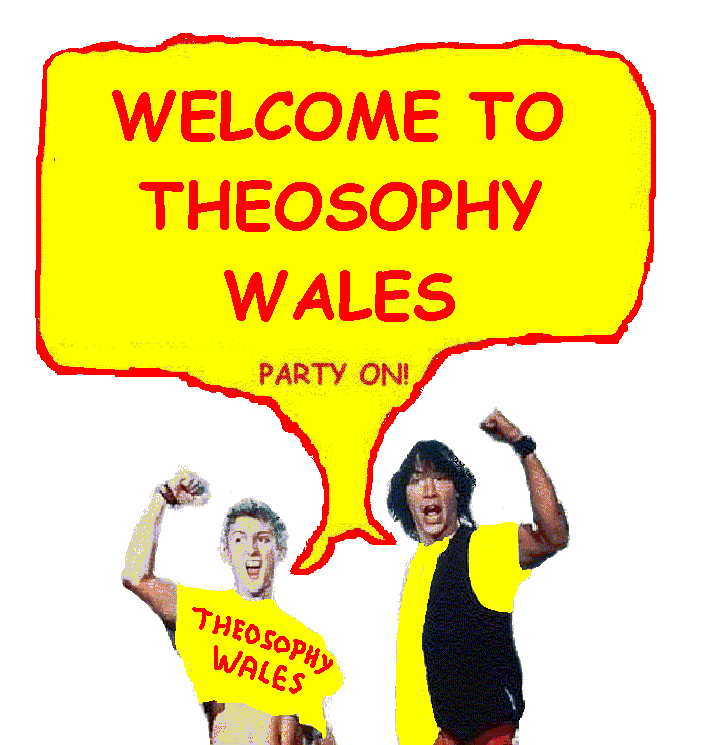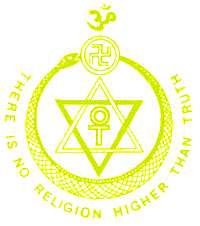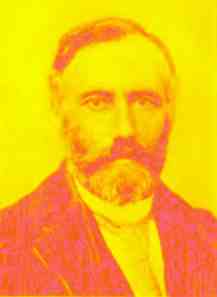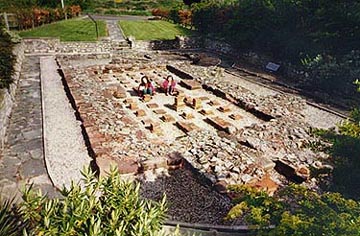

____________
THE
OF
THEOSOPHY

A Definitive Work on Theosophy
By
William Quan Judge

CHAPTER 5
Body and
Astral Body
The body, as a mass of flesh, bones, muscles, nerves, brain matter,
bile, mucous, blood, and skin is an object of exclusive care for too many
people, who make it their god because they have come to identify themselves
with it, meaning it only when they say "I." Left to itself it is
devoid of sense, and acts in
such a case solely by reflex and automatic action. This we see in sleep,
for then the body assumes attitudes and makes motions which the waking man does
not permit. It is like mother earth in that it is made up of an infinitesimal
number of "lives." Each of these lives is a sensitive point. Not only
are there microbes, bacilli, and bacteria, but these are composed of others,
and those others of still more minute lives. These lives are not the cells of
the body, but make up the cells, keeping ever within the limits assigned by
evolution to the cell.
They are forever whirling and moving together throughout the whole body,
being in certain apparently void spaces as well as where flesh, membrane,
bones, and blood are seen. They extend, too, beyond the actual outer limits of
the body to a measurable distance.
One of the mysteries of physical life is hidden among these
"lives." Their action, forced forward by the Life energy -- called Prana
or Jiva -- will explain active existence and physical death. They are divided
into two classes, one the destroyers, the other the preservers, and these two
war upon each other from birth until the destroyers win. In this struggle the
Life Energy itself ends the contest because it is life that kills. This may
seem heterodox, but in Theosophical philosophy it is held to be the fact. For,
it is said, the infant lives because the combination of healthy organs is able
to absorb the life all around it in space, and is put to sleep each day by the
overpowering strength of the stream of life, since the preservers among the
cells of the youthful body are not yet mastered by the other class.
These processes of going to sleep and waking again are simply and solely
the restoring of the equilibrium in sleep and the action produced by disturbing
it when awake. It may be compared with the arc-electric light wherein the
brilliant arc of light at the point of resistance is the symbol of the waking
active man. So in sleep we are again absorbing and not resisting the Life
Energy; when we wake we are throwing it off. But as it exists around us like an
ocean in which we swim, our power to throw it off is necessarily limited. Just
when we wake we are in equilibrium as to our organs and life; when we fall
asleep we are yet more full of life than in the morning; it has exhausted us;
it finally kills the body. Such a contest could not be waged forever, since the
whole solar system's weight of life is pitted against the power to resist
focussed in one small human frame.
The body is considered by the Masters of Wisdom to be the most
transitory, impermanent, and illusionary of the whole series of constituents in
man. Not for a moment is it the same. Ever changing, in motion in every part,
it is in fact never complete or finished though tangible. The ancients clearly
perceived this, for they elaborated a doctrine called Naimittika [the correct
Sanskrit term is Nitya] Pralaya, or the continual change in material things,
the continual destruction.
This is known now to science in the doctrine that the body undergoes a
complete alteration and renovation every seven years. At the end of the first
seven years it is not the same body it was in the beginning. At the end of our
days it has changed seven times, perhaps more. And yet it presents the same
general appearance from maturity until death; and it is a human form from birth
to maturity. This is a mystery science explains not; it is a question
pertaining to the cell and to the means whereby the general human shape is
preserved.
The "cell" is an illusion. It is merely a word. It has no
existence as a material thing, for any cell is composed of other cells. What,
then, is a cell? It is the ideal form within which the actual physical atoms --
made up of the "lives" -- arrange themselves. As it is admitted that
the physical molecules are forever rushing away from the body, they must be
leaving the cells each moment.
Hence there is no physical cell, but the privative limits of one, the
ideal walls and general shape. The molecules assume position within the ideal
shape according to the laws of nature, and leave it again almost at once to
give place to other atoms. And as it is thus with the body, so is it with the
earth and with the solar system. Thus also is it, though in slower measure,
with all material objects. They are all in constant motion and change. This is
modern and also ancient wisdom. This is the physical explanation of
clairvoyance, clairaudience, telepathy, and mind-reading. It helps to show us
what a deluding and unsatisfactory thing our body is.
Although, strictly speaking, the second constituent of man is the Astral
Body -- called in Sanskrit Linga Sarira -- we will consider Life Energy -- or
Prana and Jiva in Sanskrit -- together, because to our observation the
phenomenon of life is more plainly exhibited in connection with the body.
Life is not the result of the operation of the organs, nor is it gone
when the body dissolves. It is a universally pervasive principle. It is the
ocean in which the earth floats; it permeates the globe and every being and
object on it. It works unceasingly on and around us, pulsating against and
through us forever.
When we occupy a body we merely use a more specialized instrument than
any other for dealing with both Prana and Jiva. Strictly speaking, Prana is
breath; and as breath is necessary for continuance of life in the human
machine, that is the better word. Jiva means "life," and also is
applied to the living soul, for the life in general is derived from the Supreme
Life itself. Jiva is therefore capable of general application, whereas Prana is
more particular.
It cannot be said that one has a definite amount of this Life Energy
which will fly back to its source should the body be burned, but rather that it
works with whatever be the mass of matter in it. We, as it were, secrete or use
it as we live. For
whether we are alive or dead, life-energy is still there; in life among
our organs sustaining them, in death among the innumerable creatures that arise
from our destruction.
We can no more do away with this life than we can erase the air in which
the bird floats, and like the air it fills all the spaces on the planet, so
that nowhere can we lose the benefit of it nor escape its final crushing power.
But in working upon the physical body this life -- Prana -- needs a vehicle,
means, or guide, and this vehicle is the astral body.
There are many names for the Astral Body. Here are a few: Linga Sarira,
Sanskrit, meaning design body, and the best one of all; ethereal double;
phantom; wraith; apparition; doppelganger; personal man; perisprit; irrational
soul; animal soul; Bhuta; elementary; spook; devil; demon. Some of these apply
only to the astral body when devoid of the corpus after death. Bhuta, devil,
and elementary are nearly synonymous; the first Sanskrit, the other English.
With the Hindus the Bhuta is the Astral Body when it is by death
released from the body and the mind; and being thus separated from conscience,
is a devil in their estimation. They are not far wrong, if we abolish the old
notion that a devil is an angel fallen from heaven, for this bodily devil is
something which rises from
the earth.
It may be objected that the term Astral Body is not the right one for
this purpose. The objection is one which arises from the nature and genesis of
the English language, for as that has grown up in a struggle with nature and
among a commercial people it has not as yet coined the words needed for
designating the
great range of faculties and organs of the unseen man. And as its
philosophers have not admitted the existence of these inner organs, the right
terms do not exist in the language. So in looking for words to describe the
inner body the only ones found in English were the "astral body."
This term comes near to the
real fact, since the substance of this form is derived from cosmic
matter or star matter, roughly speaking. But the old Sanskrit word describes it
exactly -- Linga Sarira, the design body -- because it is the design or model
for the physical body. This is better than "ethereal body," as the
latter might be said to be subsequent to the physical, whereas in fact the
astral body precedes the material one.
The astral body is made of matter of very fine texture as compared with
the visible body, and has a great tensile strength, so that it changes but
little during a lifetime, while the physical alters every moment. And not only
has it this immense strength, but at the same time possesses an elasticity
permitting
its extension to a considerable distance. It is flexible, plastic,
extensible, and strong.
The matter of which it is composed is electrical and magnetic in its
essence, and is just what the whole world was composed of in the dim past when
the processes of evolution had not yet arrived at the point of producing the
material body for man. But it is not raw or crude matter. Having been through a
vast period of evolution and undergone purifying processes of an incalculable
number, its nature has been refined to a degree far beyond the gross physical
elements we see and touch with the physical eye and hand.
The astral body is the guiding model for the physical one, and all the
other kingdoms have the same astral model. Vegetables, minerals, and animals
have the ethereal double, and this theory is the only one which will answer the
question how it is that the seed produces its own kind and all sentient beings
bring forth their like. Biologists can only say that the facts are as we know
them, but can give no reason why the acorn will never grow anything but an oak
except that no man ever knew it to be otherwise. But in the old schools of the
past the true doctrine was known, and it has been once again brought out in the
West
through the efforts of H. P. Blavatsky and those who have found
inspiration in her works.
This doctrine is, that in early times of the evolution of this globe the
various kingdoms of nature are outlined in plan or ideal form first, and then
the astral matter begins to work on this plan with the aid of the Life
principle, until after long ages the astral human form is evolved and
perfected.
This is, then, the first form that the human race had, and corresponds
in a way with the allegory of man's state in the garden of Eden. After another
long period, during which the cycle of further descent into matter is rolling
forward, the astral
form at last clothes itself with a "coat of skin," and the
present physical form is on the scene.
This is the explanation of the verse of the book of Genesis
which describes the giving of coats of skin to Adam and Eve. It is the
final fall into matter, for from that point on the man within strives to raise
the whole mass of physical substance up to a higher level, and to inform it all
with a larger measure of spiritual influence, so that it may be ready to go
still
further on during the next great period of evolution after the present
one is ended. So at the present time the model for the growing child in the
womb is the astral body already perfect in shape before the child is born.
It is on this the molecules arrange themselves until the child is
complete, and the presence of the ethereal design-body will explain how the
form grows into shape, how the eyes push themselves out from within to the
surface of the face, and many other mysterious matters in embryology which are
passed over by medical men with a description but with no explanation. This
will also explain, as nothing else can, the cases of marking of the child in
the womb sometimes denied by physicians but well-known by those who care to
watch, to be a fact of frequent
occurrence.
The growing physical form is subject to the astral model; it is
connected with the imagination of the mother by physical and psychical organs;
the mother makes a strong picture from horror, fear, or otherwise, and the
astral model is then similarly affected. In the case of marking by being born
legless, the ideas and strong imagination of the mother act so as to cut off or
shrivel up the astral leg, and the result is that the molecules, having no
model of leg to work on, make no physical leg whatever; and similarly in all
such cases. But where we find a man who still feels the leg which the surgeon
has cut off, or perceives the fingers that were amputated, then the astral
member has not been interfered with, and hence the man feels as if it were
still on his person. For knife or acid will not injure the astral model, but in
the first stages of its growth ideas and imagination have the power of acid and
sharpened steel.
In the ordinary man who has not been trained in practical occultism or
who has not the faculty by birth, the astral body cannot go more than a few
feet from the physical one. It is a part of that physical, it sustains it and
is incorporated in it just as the fibres of the mango are all through that
fruit.
But there are those who, by reason of practices pursued in former lives
on the earth, have a power born with them of unconsciously sending out the
astral body.
These are mediums, some seers, and many hysterical, cataleptic, and
scrofulous people. Those who have trained themselves by a long course of
excessively hard discipline which reaches to the moral and mental nature and
quite beyond the power of the average man of the day, can use the astral form
at will, for they
have gotten completely over the delusion that the physical body is a
permanent part of them, and, besides, they have learned the chemical and
electrical laws governing in this matter. In their case they act with knowledge
and consciously; in the other cases the act is done without power to prevent
it, or to bring it
about at will, or to avoid the risks attendant on such use of potencies
in nature of a high character.
The astral body has in it the real organs of the outer sense organs. In
it are the sight, hearing, power to smell, and the sense of touch. It has a
complete system of nerves and arteries of its own for the conveyance of the
astral fluid which is to that body as our blood is to the physical. It is the
real personal man. There are located the subconscious perception and the latent
memory, which the hypnotizers of the day are dealing with and being baffled by.
So when the body dies the astral man is released, and as at death the
immortal man -- the Triad -- flies away to another state, the astral becomes a
shell of the once living man and requires time to dissipate. It retains all the
memories of the life lived by the man, and thus reflexly and automatically can
repeat what the
dead man knew, said, thought, and saw. It remains near the deserted
physical body nearly all the time until that is completely dissipated, for it
has to go through its own process of dying. It may become visible under certain
conditions. It is the spook of the spiritualistic seance-rooms, and is there
made to masquerade as the real spirit of this or that individual.
Attracted by the thoughts of the medium and the sitters, it vaguely flutters
where they are, and then is galvanized into a factitious life by a whole host
of elemental forces and by the active astral body of the medium who is holding
the seance or of any other medium in the audience. From it (as from a
photograph) are then reflected into the medium's brain all the boasted
evidences which spiritualists claim go to prove identity of deceased friend or
relative.
These evidences are accepted as proof that the spirit of the deceased is
present, because neither mediums nor sitters are acquainted with the laws
governing their own nature, nor with the constitution, power, and function of
astral matter and astral man.
The Theosophical philosophy does not deny the facts proven in
spiritualistic seances, but it gives an explanation of them wholly opposed to
that of the spiritualists. And surely the utter absence of any logical
scientific explanation by these so-called spirits of the phenomena they are
said to produce supports the contention that they have no knowledge to impart.
They can merely cause certain phenomena; the examination of those and
deductions therefrom can only be properly carried on by a trained brain guided
by a living trinity of spirit, soul, and mind. And here another class of
spiritualistic phenomena requires brief notice. That is the appearance of what
is called a "materialized spirit."
Three explanations are offered: First, that the astral body of the
living medium detaches itself from its corpus and assumes the appearance of the
so-called spirit; for one of the properties of the astral matter is capacity to
reflect an image existing unseen in ether. Second, the actual astral shell of
the deceased -- wholly devoid of his or her spirit and conscience -- becomes
visible and
tangible when the condition of air and ether is such as to so alter the
vibration of the molecules of the astral shell that it may become visible. The
phenomena of density and apparent weight are explained by other laws. Third, an
unseen mass of electrical and magnetic matter is collected, and upon it is
reflected out of the astral light a picture of any desired person either dead
or living. This is taken to be the "spirit" of such persons, but it
is not, and has been justly called by H. P. Blavatsky a "psychological
fraud," because it pretends to be what it is not. And, strange to say,
this very explanation of materializations has been given by a
"spirit" at a regular seance, but has never been accepted by the
spiritualists just because it upsets their notion of the return of the spirits
of deceased persons.
Finally, the astral body will explain nearly all the strange psychical
things happening in daily life and in dealings with genuine mediums; it shows
what an apparition may be and the possibility of such being seen, and thus
prevents the scientific doubter from violating good sense by asserting you did
not see what you know you have seen; it removes superstition by showing the
real nature of these phenomena, and destroys the unreasonable fear of the
unknown which makes a man afraid to see a "ghost." By it also we can
explain the apportation of
objects without physical contact, for the astral hand may be extruded
and made to take hold of an object, drawing it in toward the body.
When this is shown to be possible, then travelers will not be laughed at
who tell of seeing the Hindu yogi make coffee cups fly through the air and
distant objects approach apparently of their own accord untouched by him or
anyone else.
All the instances of clairvoyance and clairaudience are to be explained
also by the astral body and astral light. The astral -- which are the real --
organs do the seeing and the hearing, and as all material objects are
constantly in motion among their own atoms the astral sight and hearing are not
impeded, but work at a distance as great as the extension of the astral light
or matter around and about the earth. Thus it was that the great seer
Swedenborg saw houses burning in the city of Stockholm when he was at another
city many miles off, and by the same means any clairvoyant of the day sees and
hears at a distance.
______________________
THE
OF
THEOSOPHY

Find out more about
Theosophy with these links

The Cardiff Theosophical Society Website
The National
Wales Theosophy Website
Theosophy
Wales Youtube Channel
Ten Benefits of Studying the Blavatskyan
Theosophical Teachings
Studying
the Blavatskyan Theosophical teachings offers numerous benefits that can
greatly enrich one's understanding of spirituality, philosophy, and the nature
of reality.† Theosophy, as defined by the
writings of Helena Petrovna Blavatsky, has had a profound impact on the
spiritual and philosophical landscape of the modern world. Blavatsky's
teachings draw from a wide range of religious and philosophical traditions,
including Hinduism, Buddhism, and Western esotericism, and present a
comprehensive worldview that addresses fundamental questions about existence,
consciousness, and the cosmos.
Here
are ten benefits of studying the Blavatskyan Theosophical Teachings
1. Exploration
of Esoteric Wisdom
One
of the primary benefits of studying the Blavatskyan Theosophical teachings is
the opportunity to explore esoteric wisdom that is often not readily accessible
in mainstream religious or philosophical traditions. Blavatsky's writings delve
into the esoteric teachings of ancient cultures and mystery schools, shedding
light on profound spiritual truths that have been passed down through the ages.
By delving into these esoteric teachings, students of Theosophy can gain insights
into the nature of consciousness, the structure of the cosmos, and the
evolution of the soul or immortal self.
2.
Synthesis of Eastern and Western Philosophy
Blavatsky's
Theosophical teachings synthesize elements of Eastern and Western philosophy,
offering a comprehensive framework that integrates concepts from diverse
cultural and religious traditions. This synthesis provides students with a
broader perspective on philosophical and spiritual thought, allowing them to
see the underlying unity of seemingly disparate belief systems. By studying
Theosophy, individuals can gain a deeper appreciation for the universal
principles that underlie all wisdom traditions, fostering a sense of unity and
interconnectedness with the world's spiritual heritage.
3.
Understanding of Universal Brotherhood
Central
to Blavatsky's Theosophical teachings is the principle of universal
brotherhood, which emphasizes the essential unity of all beings and the
interconnectedness of life. By studying Theosophy, individuals can develop a
profound understanding of the interconnected nature of existence, recognizing
that all living beings are fundamentally linked and that compassion and empathy
are essential for the evolution of humanity. This understanding can lead to a
greater sense of empathy, kindness, and social responsibility, fostering a more
harmonious and compassionate society.
4.
Insight into the Nature of Reality
The
Blavatskyan Theosophical teachings offer profound insights into the nature of
reality, consciousness, and the unseen dimensions of existence. Through the
study of Theosophy, individuals can explore concepts such as the
multi-dimensional nature of the universe, the existence of subtle energy
realms, and the interconnectedness of the material and spiritual planes. This
exploration can lead to a deeper understanding of the nature of reality beyond
the limitations of the physical senses, opening up new vistas of perception and
understanding.
5.
Personal Spiritual Growth
Studying
the Theosophical teachings can be a transformative journey that facilitates
personal spiritual growth and self-discovery. Blavatsky's writings offer
practical guidance for inner development, including meditation practices,
ethical principles, and the cultivation of spiritual virtues. By applying these
teachings to their lives, individuals can experience profound personal
transformation, leading to greater self-awareness, inner peace, and a sense of
purpose and meaning.
6.
Ethical and Moral Guidance
The
Theosophical teachings provide a comprehensive ethical and moral framework that
can guide individuals in their personal and social interactions. Blavatsky
emphasizes the importance of ethical conduct, altruism, and the pursuit of
wisdom, offering practical guidance for leading a virtuous and meaningful life.
By studying Theosophy, individuals can gain clarity on moral issues, cultivate
a sense of ethical responsibility, and contribute to the greater good of
humanity.
7.
Appreciation of Comparative Religion
The
study of Theosophy encourages an appreciation of comparative religion and the
underlying unity of religious and spiritual traditions. Blavatsky's writings
explore the common threads that run through the world's religions, highlighting
universal spiritual principles that transcend cultural and historical
boundaries. By gaining a deeper understanding of comparative religion through
Theosophy, individuals can develop a more inclusive and pluralistic
perspective, fostering interfaith harmony and mutual respect.
8.
Intellectual Stimulation
The Theosophical
teachings offer a rich and intellectually stimulating framework for exploring
profound philosophical and metaphysical concepts. Blavatsky's writings
encompass a wide range of subjects, including cosmology, metaphysics, ancient
wisdom, and the evolution of consciousness, providing ample material for
intellectual inquiry and contemplation. By engaging with these teachings,
individuals can expand their intellectual horizons, develop critical thinking
skills, and gain a deeper understanding of the fundamental questions that have
intrigued philosophers and mystics throughout history.
9.
Healing and Reconciliation
The
Theosophical teachings offer insights into the nature of healing and
reconciliation, both on a personal and collective level. Blavatsky's writings
delve into the esoteric principles of healing, the nature of disease, and the
interconnectedness of mind, body, and spirit. By studying Theosophy,
individuals can gain a deeper understanding of holistic healing modalities, the
power of the mind in influencing health, and the potential for spiritual
transformation through the healing process. Furthermore, the Theosophical
emphasis on universal brotherhood and compassion can contribute to the
reconciliation of divisions and conflicts within society, fostering a more
harmonious and peaceful world.
10.
Contribution to Global Transformation
Finally,
studying the Blavatskyan Theosophical teachings can empower individuals to
contribute to the ongoing global transformation towards a more enlightened and
compassionate world. Blavatsky's vision of a spiritually awakened humanity,
working towards the betterment of all beings, inspires individuals to engage in
positive action and service to humanity. By embodying the principles of
Theosophy in their lives, individuals can become agents of positive change,
working towards the realization of a more just, peaceful, and sustainable
world.
In
summary, the study of the Blavatskyan Theosophical teachings offers a wide
range of benefits, ranging from personal spiritual growth to the potential for
global transformation. By delving into the esoteric wisdom, ethical principles,
and philosophical insights of Theosophy, individuals can expand their
understanding of the nature of reality, cultivate compassion and empathy, and
contribute to the evolution of humanity towards a more harmonious and
enlightened future. As the Theosophical teachings continue to inspire and guide
seekers of truth and wisdom, their profound impact on individuals and society
is likely to endure for generations to come.
If you run a Theosophy Group, please feel free
to use any of the material on this site
The Most Basic Theosophy
†Website in the Universe
A quick overview of Theosophy†
and the Theosophical Society
If you run a Theosophy Group you†
can use this as an introductory handout.
Theosophy Cardiffís Instant Guide
One liners and quick explanations
H P Blavatsky is
usually the only
Theosophist that
most people have ever
heard of. Letís
put that right
The Voice of the Silence Website
An Independent Theosophical Republic
Links to Free Online Theosophy†
Study Resources; Courses, Writings,†
The main criteria
for the inclusion of
links on this
site is that they have some
relationship
(however tenuous) to Theosophy
and are
lightweight, amusing or entertaining.
Topics include
Quantum Theory and Socks,
Dick Dastardly and Legendary Blues Singers.
A selection of
articles on Reincarnation
Provided in
response to the large†
number of enquiries
we receive at†
Cardiff
Theosophical Society on this subject
The Voice of the Silence Website
This is for everyone, you donít have to live
in Wales to make good use of this Website
Llanidan Old Church, Brynsiencyn,
Anglesey, North Wales.
The 14th Century
church was abandoned in 1844
Llanidan Church,
Brynsiencyn, Anglesey, North Wales.
No Aardvarks were harmed in the
The Spiritual Home of Urban Theosophy
The Earth Base for Evolutionary Theosophy
A B C D EFG H IJ KL M N OP QR S T UV WXYZ
Complete Theosophical Glossary in Plain Text Format
1.22MB
Quick Explanations with Links to
More Detailed Info
What is Theosophy ? Theosophy Defined (More Detail)
Three Fundamental Propositions† Key Concepts of Theosophy
Cosmogenesis†
Anthropogenesis†
Root Races†
Karma
Ascended Masters† After Death States† Reincarnation
The Seven Principles of Man† Helena Petrovna Blavatsky
Colonel Henry Steel Olcott William Quan Judge
The Start of the Theosophical Society
History of the Theosophical Society
Theosophical Society Presidents
History of the Theosophical Society in Wales
The Three Objectives of the Theosophical Society
Explanation of the Theosophical Society Emblem
Glossaries of Theosophical Terms
An Outstanding
Introduction to Theosophy
By a student of
Katherine Tingley
Elementary Theosophy Who is the Man?† Body and Soul
Body, Soul and Spirit† Reincarnation† Karma
What Theosophy Is† From the Absolute to Man
The Formation of a Solar System† The Evolution of Life
The Constitution of Man† After Death† Reincarnation
The Purpose of Life† The Planetary Chains
The Result of Theosophical Study
On the North Wales
coast 22 miles from
the main Roman
Legionary Fort at Chester,
The baths are
believed to be part of a harbour complex
for shipping lead from local mines
An Outline of Theosophy
Charles Webster Leadbeater
Theosophy - What it is† How is it Known?† The Method of Observation
General Principles† The Three Great Truths† The Deity
Advantage Gained from this
Knowledge† The Divine Scheme
The Constitution of Man† The True Man† Reincarnation
The Wider Outlook† Death† Manís Past and Future
Cause and Effect† What Theosophy does for us
Try these if you are looking for a local
Theosophy Group or Centre
UK Listing of Theosophical Groups
Please tell us about your UK Theosophy Group
___________________
into categories
and presented according to relevance of website.
Web Directory
- Add Link - Submit Article - Online Store - Forum



